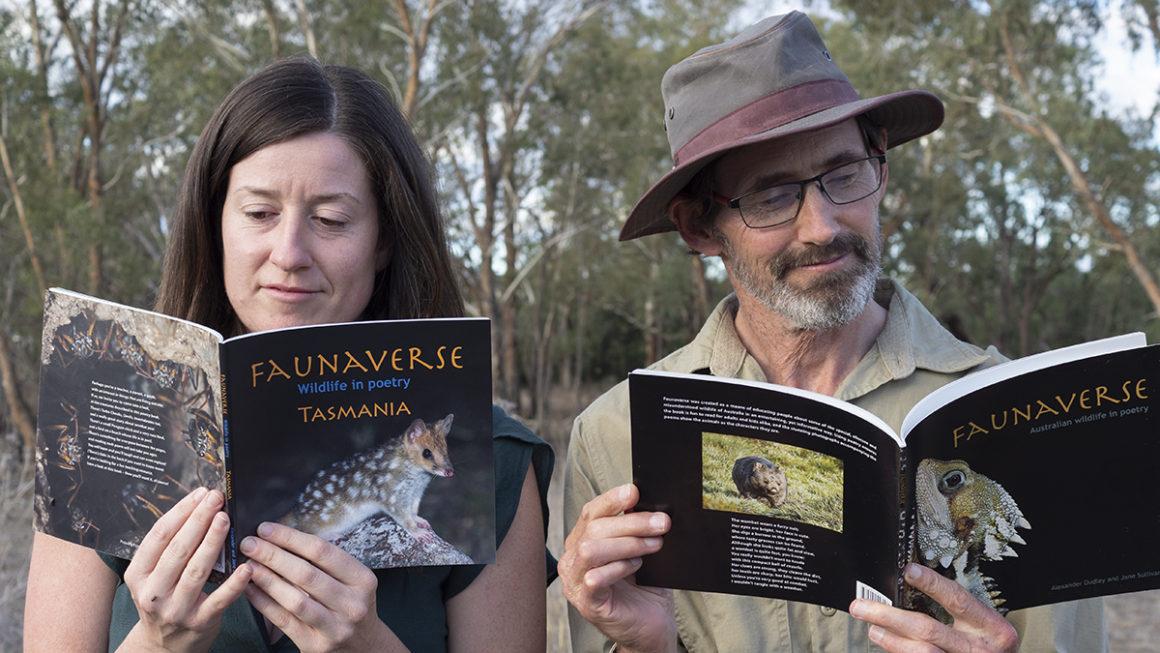It’s unsurprising that Alex and Jane Dudley believe in the power of wildlife education to change lives for the better – the couple met through a frog. Years ago, while living on a farm in the Hunter Valley, Jane found a frog in her raincoat and contacted Alex through a friend to help her identify it. Today, Alex and Jane run Faunaverse, a company dedicated to educating people about the natural world through artistic pursuits. Faunaverse aims to close the gap between humans and the natural world around us. The concept, as Jane explains, is basically: ‘hey, you live in an amazing place, why don’t you go outside and look?’
When the couple were first together, Alex took Jane to see tree kangaroos in Queensland. Jane recalls: ‘I was like, excuse me, what now? We have kangaroos that live in trees? That was kind of a life-changing moment for me, because I realised they are endangered and they could go extinct in my lifetime. I felt that I represented the average Australian, and the average Australian doesn’t know much about the existence of these animals.’
A natural storyteller, Alex has long been using that talent to engage people with the natural world. He spent many years working as a Tasmanian Parks and Wildlife Discovery Ranger, running workshops and activities for the public. Jane was about the 500th person to tell him to write a book, he says, and eventually, the idea stuck.
To date, Faunaverse has published two books of ecopoetry (written by the couple and photographed by Alex). Their latest book, Faunaverse Wildlife in Poetry Tasmania, is the winner of the prestigious Whitley Award for zoological literature.
The idea of the ecopoems is to be accessible, fun and educational all at once. ‘When you sit down to read a story book to a child you’re sort of locked in for half an hour or more,’ Alex says. ‘And some of our most beloved children’s books aren’t very educational – they teach things like feeding lamingtons to possums!’
While Alex has no serious objections to fictional possums eating lamingtons, the ecopoems are intended to be scientifically sound as well as entertaining. One or two can be easily read as a quick bedtime activity and, if sleep comes calling early, the possums won’t go hungry.
Alex and Jane like to give exposure to some of our lesser-known wildlife, too. They create songs and video poems that tell the stories of these not-so-beloved animals. ‘We try to use anthropomophism to promote empathy,’ explains Jane. ‘We try to put in weird things like Velvet Worms, Assassin Bugs and March Flies – some of the less loved or known-about species that are just as important in the ecosystem.’ One such character is Milena The March Fly, who puts a face and name to this important pollinator species which might otherwise be sooner swatted away than appreciated for its ecosystem services.
Alex and Jane also run a ‘school safari’programs, teaching school kids about the natural world and inspiring them to get out and explore. Jane and Alex were surprised by how little many of the children knew about their environment. ‘A lot of these kids are living on farms,’ says Jane of the local kids near their home in rural New South Wales, ‘but they’ve never even heard of things like Squirrel Gliders. When we moved to the bush, I just assumed that “bush kids” were outside all the time – they’re not.’
This doesn’t mean the children aren’t interested, though. ‘We take them into the playground with magnifying glasses, encourage them to go outside at night with a torch,’ Alex says. ‘The first time a kid spotlights their own wolf spider, it’s like magic.’
‘I know that it does have an effect on people,’ Alex says of their work. He has a poem he recites to the school kids in which a conversational skink explains the perils of logging and collecting for firewood:
“What’s wrong with burning firewood? It’s better than being cold.”
“It isn’t wood for burning.” the lizard seemed to scold.
“Those logs that lie upon the ground are shelter, home, and larder,
When people pick them up it makes survival that much harder.
A hollow log that takes at least a century to form,
Is destroyed in twenty minutes – when a coat would keep you warm!
We need those logs to bask on, and to shelter from the rain;
Surely putting on a coat’s not that much of a pain?”
©Alexander Dudley, Faunaverse
Following their visits to the schools, Alex says, ‘We get parents coming up to us and saying, “We’re not allowed to have fires any more!”’
In another telling example of ‘The Alex Effect’, while working in a National Park a few years back, Alex was recognised by a man in the group. ‘I went to one of your activities when I was 12 years old,’ he told Alex. ‘I’m working as a ranger now because of you!’
Alex and Jane have no plans to stop their work. They want to produce a podcast as well as keep on making books, songs and video poems. They want to get a van and travel around the country, writing. ‘Our next book is going to be on the wet tropics,’ says Jane.
To Alex and Jane, creating closer connections between humans and the natural world is not a niche or idealistic desire: it’s essential, for humans and the environment alike. As someone who has suffered from serious mental illness, Jane credits the huge amount of time she’s spent out in the bush with a dramatic improvement in her health.
‘In this day and age you have to be taught how to connect to nature,’ she says. Which is, of course, exactly where Faunaverse comes in.
‘We are part of nature,’ insists Alex. ‘We cannot get away from that.’
Banner image provided by Faunaverse. Their books of ecopoetry are available for purchase on their website.


Leave a Reply